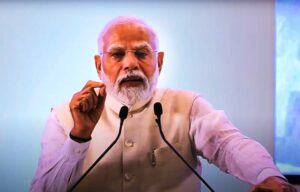
Greater Noida, Sept 11: Prime Minister Narendra Modi on Wednesday said resilience of supply chains is critical for the economy as he made a pitch to boost investments in domestic manufacturing of semiconductors — the foundation of everything from smartphones to EV and AI.
Speaking at the SEMICON 2024 conference on the outskirts of the national capital, the Prime Minister said the Covid pandemic showed the importance of the supply chain and underscored the need to act to ward off any disruption.
“Whether it was Covid or war, there hasn’t been a single industry to remain unaffected by supply chain disruptions,” he said.
Stressing the importance of a resilient supply chain, the Prime Minister expressed pride in India’s central role in building resilience across sectors, positioning the country as a key player in the global mission to safeguard supply chains.
“Resilience of the supply chain is very important,” he said. “India is working to create the same in different sectors of the economy.”
A halt in flights, factory shutdowns in China, and surges in demand for specific products broke supply chains during Covid-19. One of the sectors impacted was chips that form a critical part of every electronic device.
Prime Minister showcased India’s reformist regime, stable policies and a market that has tasted technology to make a strong pitch for investments in semiconductor manufacturing.
“This is the right time to be in India. You are at the right place at the right time,” he said. “In 21st-century India, the chips are never down.”
He went on to state that India of today assures the world, “When the chips are down, you can bet on India.”
“Whether it is mobile manufacturing, electronics, or semiconductors, our focus is clear – we want to build a world that doesn’t stop or pause in times of crisis but keeps moving forward,” he said.
As the US-China trade war threatens to make chip imports even more expensive, countries around the world are investing aggressively to build domestic supplies of semiconductors – the foundation of everything from smartphones to electric cars and artificial intelligence (AI).
With its semiconductor market expected to touch USD 63 billion by 2026, India has created a Rs 76,000 crore program to woo chipmakers and their suppliers and cut dependence on countries such as Taiwan for imports to meet current requirements.
That programme has drawn nearly Rs 1.5 lakh crore of investment in producing about 70 million chips per day.
Tata is partnering Taiwan’s Powerchip Semiconductor Manufacturing Corp to set up India’s first chipmaking plant worth Rs 91,526 crore in Gujarat’s Dholera. Its unit Tata Semiconductor Assembly and Test Pvt Ltd is also investing Rs 27,120 crore to set up a unit in Assam.
US memory maker Micron Technology Inc is also setting up a Rs 22,516 crore assembly facility in Gujarat, while Adani Group plans to build a chip plant in Maharashtra with Israel’s Tower Semiconductor at a cost of Rs 83,947 crore. Also, CG Power is partnering with Japan’s Renesas Electronics Corp and Thailand’s Stars Microelectronics for a Rs 7,584 crore chip packaging plant in Gujarat.
“India’s semiconductor sector is on the brink of a revolution, with breakthrough advancements set to transform the industry,” Modi said, adding the country’s chip industry is equipped with special diodes where energy flows in both directions.
“Today’s India inspires confidence in the world… When the chips are down, you can bet on India,” he said.
Modi said while the country’s contribution to the world of designing is 20 per cent, India is creating a semiconductor workforce of 85,000 technicians, engineers and R&D experts.
Explaining that India holds a three-dimensional power – a reformist government, growing manufacturing base and aspirational market which is aware of the technological trends, the Prime Minister said that this base of 3D power is difficult to find elsewhere.
Stating that India is a huge consumer of such chips, he emphasized that the world’s finest digital public infrastructure was built upon it. “This small chip is doing big things to ensure last-mile delivery in India.”
Recalling the coronavirus crisis when the strongest banking systems of the world collapsed, Modi said that banks in India were running continuously. “Be it India’s UPI, Rupay Card, Digi Locker or Digi Yatra, multiple digital platforms have become a part of the everyday life of the people of India”.
To become self-reliant, the Prime Minister said that India is increasing manufacturing in every sector, making green transition on a large scale and the demand for data centers is also increasing. “India is set to play a big role in driving the global semiconductor industry.”
Pointing out the numerous steps taken by the government to promote semiconductor manufacturing, Modi highlighted that the government is offering 50 per cent financial support for setting up semiconductor manufacturing facilities, with state governments also playing a key role in this effort.
Because of these policies, he said, India has attracted investments worth more than Rs 1.5 lakh crore in a very short time and many more projects are in the pipeline.
“Our dream is that every device in the world will have an Indian-made chip,” he said, adding the government will do whatever it takes to make India a semiconductor powerhouse.
On the progress India has made in the last few years, he said the country is now the second-largest market for 5G handsets globally, just two years after the rollout of 5G.
With India’s electronics sector now valued at over USD 150 billion, the Prime Minister outlined a larger goal to grow the country’s electronics sector to USD 500 billion and create 6 million jobs by the end of this decade.
He said that this growth will directly benefit India’s semiconductor sector. “Our goal is that 100 per cent of electronic manufacturing should happen in India. India will make semiconductor chips and the finished product too.”



